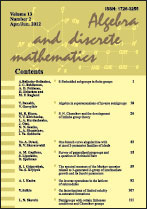|
|
Algebra and Discrete Mathematics, 2015, Volume 19, Issue 1, Pages 48–57
(Mi adm506)
|
 |
|
 |
RESEARCH ARTICLE
Symmetries of automata
Attila Egri-Nagya, Chrystopher L. Nehanivb
a Centre for Research in Mathematics, University of Western Sydney
b Centre for Computer Science \& Informatics Research, University of Hertfordshire
Abstract:
For a given reachable automaton A, we prove that the (state-) endomorphism monoid End(A) divides its characteristic monoid M(A). Hence so does its (state-)automorphism group Aut(A), and, for finite A, Aut(A) is a homomorphic image of a subgroup of the characteristic monoid. It follows that in the presence of a (state-) automorphism group G of A, a finite automaton A (and its transformation monoid) always has a decomposition as a divisor of the wreath product of two transformation semigroups whose semigroups are divisors of M(A), namely the symmetry group G and the quotient of M(A) induced by the action of G. Moreover, this division is an embedding if M(A) is transitive on states of A. For more general automorphisms, which may be non-trivial on input letters, counterexamples show that they need not be induced by any corresponding characteristic monoid element.
Received: 02.05.2014
Revised: 12.01.2015
Citation:
Attila Egri-Nagy, Chrystopher L. Nehaniv, “Symmetries of automata”, Algebra Discrete Math., 19:1 (2015), 48–57
Linking options:
https://www.mathnet.ru/eng/adm506 https://www.mathnet.ru/eng/adm/v19/i1/p48
|

| Statistics & downloads: |
| Abstract page: | 349 | | Full-text PDF : | 115 | | References: | 80 |
|




 Contact us:
Contact us: Terms of Use
Terms of Use
 Registration to the website
Registration to the website Logotypes
Logotypes









 Citation in format
Citation in format 